Related Research Articles
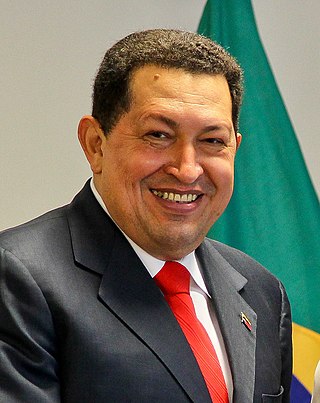
Hugo Rafael Chávez Frías was a Venezuelan politician and military officer who served as president of Venezuela from 1999 until his death in 2013, except for a brief period of forty-seven hours in 2002. Chávez was also leader of the Fifth Republic Movement political party from its foundation in 1997 until 2007, when it merged with several other parties to form the United Socialist Party of Venezuela (PSUV), which he led until 2012.

Mexican cinema dates to the late nineteenth century during the rule of President Porfirio Díaz. Seeing a demonstration of short films in 1896, Díaz immediately saw the importance of documenting his presidency in order to present an ideal image of it. With the outbreak of the Mexican Revolution in 1910, Mexican and foreign makers of silent films seized the opportunity to document its leaders and events. From 1915 onward, Mexican cinema focused on narrative film.

While the Peruvian film industry has not been nearly as prolific as that of some other Latin American countries, such as Mexico or Argentina, some Peruvian movies produced enjoyed regional success. Historically, the cinema of Peru began in Iquitos in 1932 by Antonio Wong Rengifo because of the rubber boom and the intense arrival of foreigners with technology to the city, and thus continued an extensive, unique filmography, with a different style than the films made in the capital, Lima.
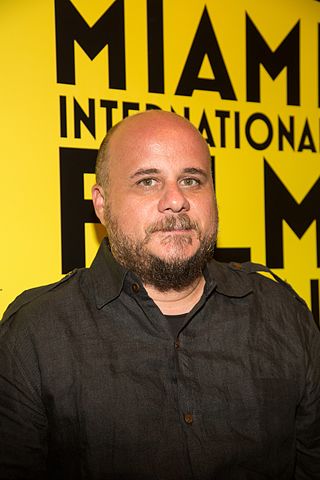
Carlos Caridad Montero is a Venezuelan film director, scriptwriter, and journalist, from the Escuela de Cine y Televisión de San Antonio de los Baños, Cuba. He now resides in Caracas.
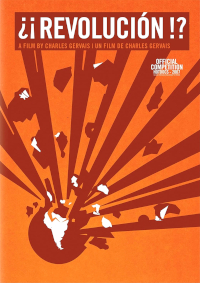
¿¡Revolución!? is a 2006 political documentary directed by Quebec journalist and filmmaker Charles Gervais. It examines the Bolivarian Revolution led by Venezuelan President Hugo Chávez. It was produced by Télé-Québec, the Quebec government's public television network.

The United Socialist Party of Venezuela is a left-wing to far-left socialist political party which has been the ruling party of Venezuela since 2007. It was formed from a merger of some of the political and social forces that support the Bolivarian Revolution led by President Hugo Chávez.

El Caracazo is 2005 Venezuelan historical film that deals with the events of El Caracazo, the name given to a series of riots and lootings in and around Caracas on 27 February 1989. The film was produced and directed by the veteran Venezuelan filmmaker Román Chalbaud. It is a documentary drama, not only about the titular tragedy but also putting it in historical perspective. The film cost 3 billion bolívares, provided by the Ministry of Culture.

Fundación Villa del Cine is a government-funded Venezuelan film and TV production house that was inaugurated on 3 June 2006 by Venezuelan President Hugo Chávez in the city of Guarenas, near the capital, Caracas.

The cinema of Venezuela is the production and industry of filmmaking in Venezuela. Venezuelan cinema has been characterised from its outset as propaganda, partially state-controlled and state-funded, commercial cinema. The nation has seen a variety of successful films, which have reaped several international awards. Still, in terms of quality, it is said that though "we can point to specific people who have made great films in Venezuela [and] a couple of great moments in the history of Venezuelan cinema, [...] those have been exceptions". In the 21st century, Venezuelan cinema has seen more independence from the government, but has still been described as recently as 2017 to be at least "influenced" by the state.

Aló Presidente was a long-running, unscripted talk show hosted by former Venezuelan President Hugo Chávez. It was broadcast on Venezuelan state television and radio channels, including Venezolana de Televisión, on Sundays from 11:00am until mid/late afternoon. The show was a powerful tool in promoting Chavista socialist ideals of the Bolivarian Revolution to supporters in Venezuela and beyond. Many editions were filmed outdoors before large audiences, commonly featuring a local farm, factory, school, hospital, housing project or other public investment. Although Chávez typically appeared on television several times a week, Aló Presidente was his opportunity to reach most families on their day off.

Bolivarian propaganda is a form of nationalist propaganda, especially in Venezuela and associated with chavismo, Venezuela's socialism. This type of propaganda has been associated with Hugo Chávez's Bolivarian Revolution, which used emotional arguments to gain attention, exploit the fears of the population, create external enemies for scapegoat purposes, and produce nationalism within the population, causing feelings of betrayal for support of the opposition.
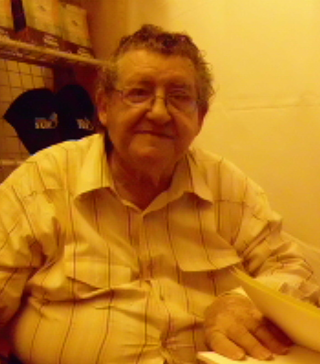
Román Chalbaud was a Venezuelan film director, screenwriter, and prominent playwright. Starting work in television after prestigious training, Chalbaud moved into making films before the industry took off in his home country, returning to theatre where he had been a great success for several years until filmmaking became a viable industry. He served as the president of Venezuela's leading theatre, television, and film organisations.

Chavismo: The Plague of the 21st Century is a 2018 documentary film directed by Gustavo Tovar-Arroyo. The film is an analysis of the causes, social, political and economic that caused the rise of Hugo Chávez as president of Venezuela; his abuse of power and the response of civil society, including the student movement; his political fall as well as the secrecy that surrounded his illness and the succession of Nicolás Maduro.

El pueblo soy yo, also known as El Pueblo Soy Yo: Venezuela en Populismo, is a 2018 documentary film directed by Venezuelan filmmaker Carlos Oteyza and produced by Mexican historian Enrique Krauze. It was inspired by Krauze's book of the same name. The film explores the populism of Hugo Chávez.

Libertador Morales, el justiciero, is a comedy-drama film produced by the Villa del Cine Foundation and directed by Efterpi Charlambidis, released on 31 July 2009. It was selected as the Venezuelan entry for the Best International Feature Film at the 82nd Academy Awards, but it was not nominated.
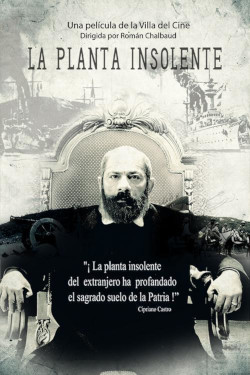
La planta insolente is a 2017 Venezuelan film directed by Román Chalbaud. The film depicts the tenure of Venezuelan President Cipriano Castro. It was a box-office flop and received generally negative reviews from critics.
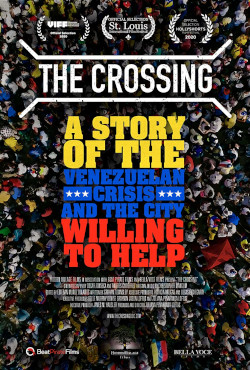
The Crossing is a 2020 documentary film directed by Colombian filmmaker Juliana Peñaranda-Loftus. The documentary focuses on the Venezuelan refugee crisis, particularly at the Colombia-Venezuela border and in Cúcuta.

Colateral is a 2019 Venezuelan documentary directed by journalist Lucrecia Cisneros. The documentary is about extrajudicial executions in Venezuela and their consequences on the affected families. The documentary was awarded several recognitions in film festivals, including in Venezuela the category of best documentary in the Short Film Contest of the National Film School and the International Festival El Grito.
References
- 1 2 3 4 5 6 7 Neoliberalism and global cinema : capital, culture, and Marxist critique. Kapur, Jyotsna., Wagner, Keith B. New York: Routledge. 2011. ISBN 9780203813638. OCLC 730500588.
{{cite book}}: CS1 maint: others (link) - 1 2 Uzcategui, Rafael. (2011). Venezuela : Revolution as Spectacle. Bufe, Chaz. Chicago: See Sharp Press. ISBN 9781884365942. OCLC 756484761.
- ↑ Political documentary cinema in Latin America. Traverso, Antonio, 1962-, Wilson, Kristi M. (1st ed.). London. 2014. ISBN 9781315769653. OCLC 1053733038.
{{cite book}}: CS1 maint: location missing publisher (link) CS1 maint: others (link) - 1 2 Drax, Victor (2019-11-13). "The Dawn of Venezuelan Horror Films". Caracas Chronicles. Retrieved 2019-11-15.
- ↑ McKay, Alastair (Winter 2008). "The Revolution Will Not Be Televised, But The Coup Attempt May Be Sexed Up". Product Magazine (Red Herring Arts and Media): 10. ISSN 1468-9901.
- ↑ Kirk, Alejandro (2005-04-26). "Film-Venezuela: Documentary Revolution". Inter Press Service. Archived from the original on 2008-01-09. Retrieved 2008-06-14.
- ↑ Holland, Alisha (2008). Venezuela: A Decade Under Chavez Political Intolerance and Lost Opportunities for Advancing Human Rights in Venezuela. Human Rights Watch. p. 69.
- ↑ "Le nouveau Quichotte?" by Jérôme Delgado, Voir, December 7, 2006 (in French)
- ↑ "Documentary film: The People and the President. A Portrait of the Bolivarian Revolution". CMI - Chr. Michelsen Institute. Retrieved 2019-09-01.
- ↑ Venezuela: Revolution from the Inside Out , retrieved 2019-09-01
- ↑ "Review: Inside the Revolution: A journey into the heart of Venezuela". Ceasefire Magazine. 2012-06-22. Retrieved 2019-09-01.
- ↑ Johnson, Reed (September 1, 2009). "Oliver Stone heads 'South of the Border' to chat up Chavez and others". Los Angeles Times . Archived from the original on January 28, 2010.
- ↑ "VICE Film School — From the Brink: Venezuela Rising". Vimeo. Retrieved 2019-09-01.
- ↑ "The art of the Bolivarian revolution in Venezuela". america.aljazeera.com. Retrieved 2019-09-01.
- ↑ "Flor de La Mar: Una Historia de Abandono" (in Spanish). Revista Endémico. Retrieved 20 July 2021.[ dead link ]
- ↑ "El ocaso del socialismo mágico - PLAY TV". ABC (in Spanish). 2017-12-02. Retrieved 2021-09-11.
- ↑ "World Premiere: In the Shadow of the Revolution". Caracas Chronicles . 2017-10-08. Retrieved 2022-02-19.
- ↑ ""Chavismo: la peste del siglo XXI" es premiado como mejor documental en Nueva York" (in Spanish). El Nuevo País. Archived from the original on 2 November 2018. Retrieved 11 December 2018.
- ↑ Sánchez Amaya, Humberto. "El pueblo soy yo, un documental para evitar la indiferencia" (in Spanish). El Nacional. Retrieved 7 February 2019.
- ↑ Salgado, Diego (2019-12-06). "Cortometraje de estudiantes de la UCAB fue premiado por la Escuela Nacional del Cine". El Ucabista (in Spanish). Retrieved 2023-05-03.
- ↑ "Doc Corner: 'A la calle'". The Film Experience. Retrieved 2022-01-29.
- ↑ "'The Crossing', un retrato de la migración venezolana que compite para los Óscars 2021". Confidencial Colombia (in Spanish). Retrieved 2022-01-29.
- ↑ "Why Latino Movie Stars Have Never Been More Necessary". Vulture. Retrieved 14 December 2018.
- ↑ Abraham, Pablo (2009). "Revista de cine Libertador Morales, el justiciero". El Espectador Imaginario. Retrieved 2019-12-16.
- ↑ "Brother (Hermano) (2012)", Rotten Tomatoes, retrieved 2019-08-31
- ↑ "Blue and Not So Pink (Azul y no tan rosa): Film Review". The Hollywood Reporter. Retrieved 2019-09-01.
- ↑ "In 'Pelo Malo,' boy's hair issues spark tensions with mother". Los Angeles Times. 22 January 2015. ISSN 0458-3035 . Retrieved 4 December 2017.
- ↑ "'From Afar' ('Desde alla'): Venice Review". Hollywood Reporter. Retrieved 13 September 2015.
- ↑ "Backed by the state, Venezuelan cinema has thrived at home and abroad". The Economist. 2017-09-15. ISSN 0013-0613 . Retrieved 2019-09-01.
- ↑ van Hoeij, Boyd (28 May 2017). "'La familia': Film Review". The Hollywood Reporter . Retrieved 30 August 2018.
- ↑ Wendy Ide (14 Jan 2020). "'La Fortaleza': Film Review - A nervy, feverish follow-up to 'La Soledad' from Venezuela's promising young director Jorge Thielen Armand". Screen International . Retrieved 20 July 2021.